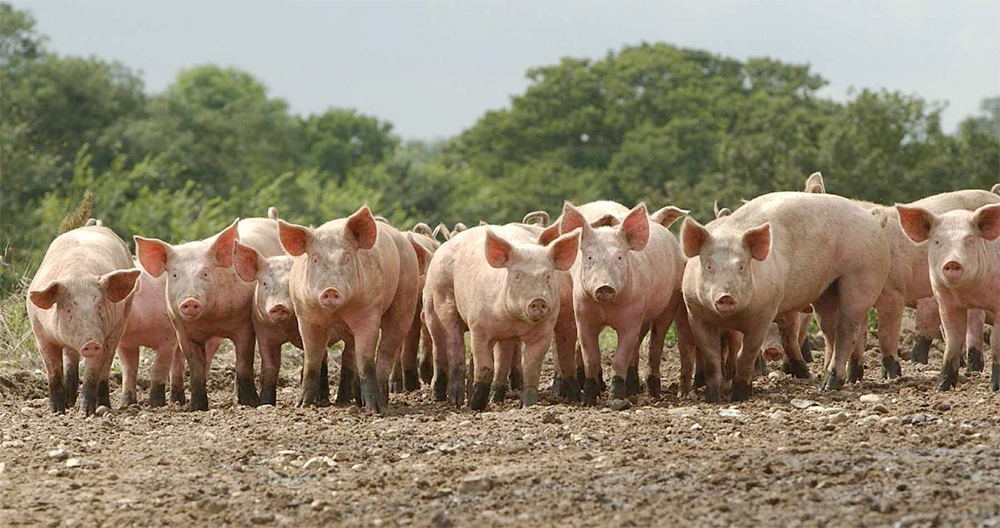CPC Reports African Swine Fever

African swine fever (ASF) is a contagious viral disease that affects pigs of all ages
The disease can spread through direct or indirect contact and causes high mortality. The virus can persist for a long time in the environment and in a variety of swine products. Humans are not susceptible to the disease but can spread the virus through contaminated clothes or equipment and imported meat products. Feral pigs and European wild boar are equally susceptible to ASF.
“Contact your herd veterinarian immediately if you see any clinical signs in pigs on your farm that could be associated with ASF infection”
EUROPE
After an outbreak in the Republic of Georgia in 2007, the virus has been spreading through the Caucasus region, the Russian Federation and Eastern Europe.
Canada imports frozen pork from regions of Poland and Hungary that are free of ASF.Pork from any affected zone or any region bordering an affected zone is banned. The EU zoning map is being used to avoid importing from contaminated or high-risk zones. The Canadian Food Inspection Agency has reviewed, and it is confident in the EU’s zoning system for ASF.
CHINA
The first outbreak of ASF in China was confirmed on August 3, 2018. The virus has spread over a vast area of China. As of August 30, 2018, 5 outbreaks have been reported. Containing the virus is a serious challenge in a country that owns almost half of the world’s domestic pigs. Their current pig production system ranges from modern, large-scale units to backyard farms, which contribute to 27 percent of the national production.Several factors complicate the containment of the virus in China:
lack of biosecurity high density of wild boars farmers illegally sending sick pigs to market in an attempt to avoid economic losses pork products being fed to backyard pigs. Because of China’s endemic status for FMD, Canada does not import live pigs or pork products from China, with the exception of Chinese dumplings. These are produced and cooked in Chinese plants that have been approved by CFIA, and the pork used does not originate from China.
Canada imports feed and feed ingredients (vitamins, amino acids, proteins) and these products and/or their packaging could pose a risk as demonstrated in a study published in 2018 by Dr. Scott Dee et al. (https://www.ncbi.nlm.nih.gov/pmc/articles/PMC5860775/) Certain viral pathogens of livestock have shown the capacity to survive in animal feed under conditions simulating transportation for an extended period of time.
The Canadian Food Inspection Agency (CFIA) has measures in place and it is actively monitoring the global situation.
Measures:
Import restrictions and border control of products brought in by international travellers are in place to minimize the chances of introducing the virus into Canada. Coordination with the Canadian Border Services Agency for border inspections. Continuous risk assessment of countries from which Canada imports. Working with the EU to monitor the situation in affected countries and update import controls as needed. Work is underway to establish harmonized diagnostic testing for ASF with the US and Mexico. CFIA is encouraging enhanced biosecurity measures including recommendations for travellers while discussing with the provincial Chief Veterinary Officers and CFIA’s American counterparts.
WHAT CANADIAN PRODUCERS CAN DO
There is no effective vaccine or treatment for ASF. The best strategy against ASF is preventing the entry of the virus into Canada.
When visiting other countries, do not bring back any meat products into Canada (this is illegal, except for cooked canned products). Wash all clothing and footwear immediately after use in other countries. Do not feed swine any human food waste.
Routinely evaluate biosecurity protocols with farm staff and visitors: Ensure that temporary foreign workers, farm staff and visitors have not had contact with swine in other countries where ASF infections have been detected.
If you suspect your herd is sick:
Contact your herd veterinarian immediately if you see any clinical signs in pigs on your farm that could be associated with ASF infection. Stop all pig movements. Never move, sell or send to livestock auctions/yards sick or compromised pigs from your farm. This will prevent further spread of infections. Implement a self-quarantine on all animals, feed and equipment until you know the cause of the illness. ACTIONS UNDERTAKEN BY THE CANADIAN PORK COUNCIL
Staff met with CFIA officials to raise awareness and understand what the agency is doing. CPC met with the Animal Nutrition Association of Canada to explore ways to address the potential risk of imported feed and feed ingredients being contaminated with ASF while communicating with the NPPC to share information and collaborate through the Canadian Swine Health Intelligence Network. Information is and will be shared with veterinarians and producers across the country.
Source: Canadian Pork Council












